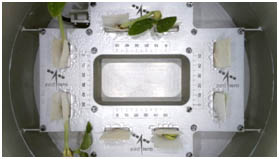India’s Breakthrough in Space Biotechnology: The CROPS Mission
The Indian Space Research Organisation (ISRO) has taken a significant step in space biotechnology with the launch of the Compact Research Module for Orbital Plant Studies (CROPS). This innovative project focuses on cultivating plants in microgravity, addressing key challenges in space farming, and laying the groundwork for long-duration manned missions and sustainable food production in space.

CROPS-1: A Milestone in Space Farming
The first mission, CROPS-1, explores the early stages of plant life, from seed germination to the development of initial leaves, in outer space. The experiment is housed in a cylindrical airtight container measuring 300 mm in diameter and 450 mm in height. This container replicates Earth-like conditions, excluding gravity, to assess how plants adapt to a microgravity environment.
CROPS-1 employs a specially designed soil medium in pellet form. This neutral clay soil has high porosity for water retention and is mixed with slow-release fertiliser for controlled nutrient delivery. Seeds are fixed securely on a polypropylene tissue using organic gum, ensuring they withstand the intense vibrations and shocks of the launch.
Innovative Technology Supporting Plant Growth
The module’s internal systems are activated by a telecommand from Earth. Water is supplied to the soil via an electric valve, triggering germination. The environment is monitored by sensors that track critical parameters, including carbon dioxide levels, temperature, humidity, and soil moisture.
To support photosynthesis, the module uses specialised lighting that simulates day and night cycles with Photosynthetically Active Radiation (PAR). Temperature regulation is achieved through tape heaters and multi-layer insulation, ensuring optimal conditions for growth in the extreme environment of space.
Results of CROPS-1
CROPS-1 was successfully launched aboard the PSLV C60 mission. Once in orbit, cowpea (Vigna Unguiculata) seeds—chosen for their short germination period—showed promising results. Within five days, the seeds germinated, and two leaves were visible, demonstrating the module’s effectiveness.
The Future of CROPS Missions
ISRO aims to expand future CROPS missions to 30–45 days, exploring advanced stages of plant growth. These missions will introduce active control systems to regulate environmental factors, such as carbon dioxide, oxygen, humidity, and temperature, for sustained plant development.
Advancing Global Space Research
CROPS is more than a technological achievement for India; it is a critical advancement for global space exploration. Understanding how to grow food in space is vital for prolonged missions and human colonisation of other planets. The success of CROPS could lead to new techniques for producing food on spacecraft and extraterrestrial habitats, ensuring astronauts’ self-sufficiency.
Through visionary initiatives like CROPS, ISRO positions India as a leader in space biotechnology, contributing to a future where humanity thrives in space.





